

No Fear Shakespeare. Language in motion. Teaching English Literature - Engelbert Thaler - Google Libri. British Council Seminars - BritLit Event Manchester. TeachingEnglish. Short Stories Free Audio & Video. Sort by Titles Per Page 1 - 10 of 307 Titles by Washington Irving Available on: Audio Download The quiet Dutch community of Sleepy Hollow lay in the Adirondack mountains on the western shore of the mighty Hudson River in America’s colonial period. by Richard Bach Online Video The tale that sent Bach soaring to fame tells the story of a seagull who practices for a lifetime to begin to know the meaning of kindness and love. by Anonymous The main frame story concerns a king and his new bride.
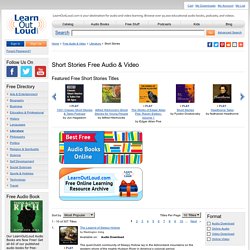
By Geoffrey Chaucer. David Copperfield. The novel David Copperfield by Charles Dickens was published serially from 1849 to 1850 and in book form in 1850.
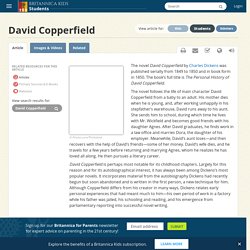
The book’s full title is The Personal History of David Copperfield. The novel follows the life of main character David Copperfield from a baby to an adult. His mother dies when he is young, and, after working unhappily in his stepfather’s warehouse, David runs away to his aunt. She sends him to school, during which time he lives with Mr. Wickfield and becomes good friends with his daughter Agnes. Definition, Scope, Types, & Facts. Literature, a body of written works.
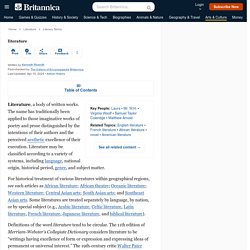
The name has traditionally been applied to those imaginative works of poetry and prose distinguished by the intentions of their authors and the perceived aesthetic excellence of their execution. Literature may be classified according to a variety of systems, including language, national origin, historical period, genre, and subject matter. Britannica Quiz Lives of Famous Writers: Fact or Fiction? The writer V.S. Department of English Literature and Linguistics. Studying English literature opens up a world of inspiration and creativity, while also developing skills that are essential for today's global environment.
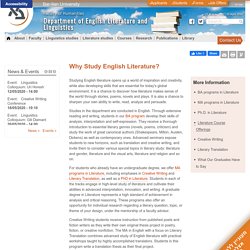
It is a chance to discover how literature makes sense of the world through stories, poems, novels and plays. It is also a chance to sharpen your own ability to write, read, analyze and persuade. Studies in the department are conducted in English. Through extensive reading and writing, students in our BA program develop their skills of analysis, interpretation and self-expression. British Literature Comparison of Romanticism and Modernism. Literary movements such as Romanticism and modernism had a broad international impact on the arts, and both had significant roots in British literature.
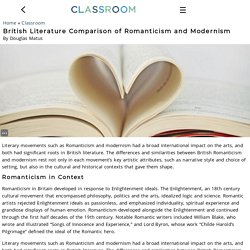
The differences and similarities between British Romanticism and modernism rest not only in each movement’s key artistic attributes, such as narrative style and choice of setting, but also in the cultural and historical contexts that gave them shape. 7 Reasons Why Literature Is So Important. Today, there are too many people who believe that literature is simply not important or underestimate its abilities to stand the test of time and give us great knowledge.
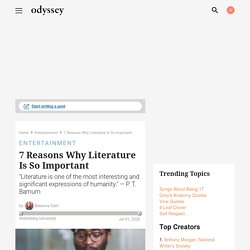
There is a stigma in society that implies one who is more inclined toward science and math will somehow be more successful in life, and that one who is more passionate toward literature and other art forms will be destined to a life of low-paying jobs and unsatisfying careers. Somewhere along the line, the world has come to think that literature is insignificant. To me, however, literature serves as a gateway to learning of the past and expanding my knowledge and understanding of the world. Here are just a few reasons why literature is important. 1. First and foremost, literature opens our eyes and makes us see more than just what the front door shows. 2. Using literature - an introduction. Click on the headings below to find out more about available materials and support for teachers in each area.
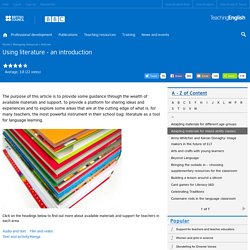
Literature in ELTThe use of literature in the ELT classroom is enjoying a revival for a number of reasons. Having formed part of traditional language teaching approaches, literature became less popular when language teaching and learning started to focus on the functional use of language. However, the role of literature in the ELT classroom has been re-assessed and many now view literary texts as providing rich linguistic input, effective stimuli for students to express themselves in other languages and a potential source of learner motivation.
On this site you can find a range of literary texts and supporting classroom materials, on the BritLit pages. Get lit up: literature as a teacher's best friend. A few, possibly, will greet its arrival amongst them with a squeak of delight and start playing with it like a favourite pet.
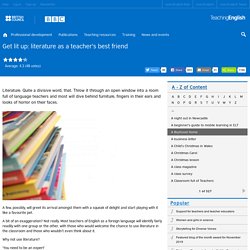
A bit of an exaggeration? Not really. Most teachers of English as a foreign language will identify fairly readily with one group or the other, with those who would welcome the chance to use literature in the classroom and those who wouldn’t even think about it. Literature articles. Audio and text. And make no mistake, this is an activity that should be done after the student has done some study of the work. It should not be used as an introduction – this would be squandering the opportunity to explore beneath the surface of the words. Poetry sources There are a number of sources for teachers to download poetry being read aloud though not all the poetry is contemporary.
Probably the biggest source is Poetry Archive, which features poets reading their own works, and as well as an ever expanding collection of contemporary poets at work, has an exciting collection of vintage recordings. There is a special section devoted to supporting teachers wishing to use the archive, though it should be noted that the teachers in mind are those teaching literature, not necessarily language, and who are working to the UK National Curriculum.
Short story sources. The Cambridge Guide to Teaching English to Speakers of Other Languages [ David Nunan, Ronald Carter] Using literature - an introduction. Language Through Literature: An Introduction - Paul Simpson. Why should Literature be Used in the Language Classroom? Allen, 1983 V.F.
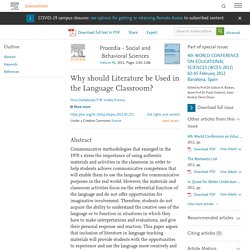
AllenTechniques in Teaching Vocabulary Oxford University Press, Oxford (1983) Cible+ - Literature in the language classroom. The Cambridge Guide to Teaching English to Speakers of Other Languages [ David Nunan, Ronald Carter] : Free Download, Borrow, and Streaming. The Cambridge Guide to Teaching English to Speakers of Other Languages edited by Ronald Carter. Crossref Citations This book has been cited by the following publications.
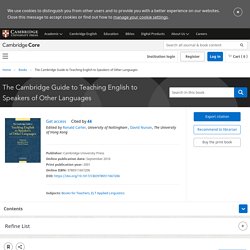
This list is generated based on data provided by CrossRef. Narcy-Combes, Marie-Françoise 2003. La communication interculturelle en anglais des affaires : transfert ou conflit d’interprétation ? Analyse d’une pratique d’enseignement en LEA. Burns, Anne 2003. SEARGEANT, PHILIP 2008. McCarthy, Michael 2008. Nowlan, Emer 2008. Cibleplus.ulb.ac. Get lit up: literature as a teacher's best friend. Literature in the language classroom (Chapter 26) - The Cambridge Guide to Teaching English to Speakers of Other Languages. Introduction. 2019 literature in english syllabus (lower and upper secondary)